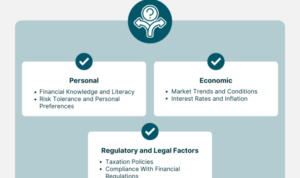Diving into the world of financial stability, get ready to explore why it’s a game-changer for both individuals and businesses. From impacting overall well-being to playing a crucial role in long-term planning, financial stability is the key to unlocking your financial potential.
Get ready for a deep dive into the factors influencing financial stability, strategies for achieving it, and how it varies across different life stages. Let’s navigate the waters of financial success together.
Importance of Financial Stability
Financial stability is crucial for individuals and businesses alike as it provides a sense of security and peace of mind. Having stable finances allows for better decision-making, reduces stress levels, and enables one to handle unexpected expenses without falling into debt.
Impact on Overall Well-being
Financial stability directly impacts overall well-being by reducing anxiety and improving mental health. When individuals and businesses are financially stable, they can focus on personal growth, career advancement, and pursuing their passions without being weighed down by financial worries.
Role in Long-term Planning and Goal Achievement
Financial stability plays a key role in long-term planning and goal achievement. It allows individuals to save for the future, invest in opportunities, and work towards their dreams with confidence. Without financial stability, it becomes challenging to set and achieve long-term goals, whether it’s buying a home, starting a business, or retiring comfortably.
Factors Influencing Financial Stability
Financial stability is influenced by various factors that play a crucial role in determining an individual’s or a family’s financial well-being. These factors can impact the ability to manage finances effectively and achieve long-term stability.
Income Levels and Financial Stability
Income levels have a significant impact on financial stability. Higher income levels generally provide more resources to cover expenses, save for the future, and invest for growth. Individuals with higher incomes may have an easier time building savings, creating emergency funds, and planning for retirement. On the other hand, lower income levels can lead to financial strain, making it challenging to cover basic expenses, save, or invest. Disparities in income levels can create barriers to achieving financial stability for many individuals and families.
Debt Management and Financial Stability
Effective debt management is crucial for achieving financial stability. Debt, when not managed properly, can become a significant burden and hinder financial progress. High levels of debt, especially in the form of credit card debt or loans with high interest rates, can drain financial resources and limit the ability to save or invest for the future. On the other hand, strategic debt management, such as paying off high-interest debt first, creating a repayment plan, and avoiding unnecessary debt, can help individuals regain control of their finances and work towards financial stability. By addressing debt effectively, individuals can reduce financial stress, improve credit scores, and build a solid financial foundation for the future.
Strategies for Achieving Financial Stability

Achieving financial stability requires implementing effective strategies to manage your finances wisely and prepare for unexpected situations. Below are some practical tips to help you enhance your financial stability:
Budgeting Tips
- Create a monthly budget outlining your income and expenses to track where your money is going.
- Limit unnecessary spending and prioritize essential expenses to avoid overspending.
- Set financial goals and allocate a portion of your income towards savings and investments.
- Review and adjust your budget regularly to ensure you are on track to meet your financial objectives.
Importance of Emergency Funds
- Emergency funds act as a financial safety net to cover unexpected expenses such as medical emergencies or job loss.
- Save at least 3 to 6 months’ worth of living expenses in an easily accessible account for emergencies.
- Having an emergency fund helps prevent the need to rely on high-interest loans or credit cards during financial crises.
- Regularly contribute to your emergency fund to ensure it remains sufficient to handle unforeseen circumstances.
Benefits of Diversification in Investments
- Diversifying your investments across different asset classes reduces the risk of losing all your money in a single investment.
- Invest in a mix of stocks, bonds, real estate, and other assets to spread out risk and maximize returns.
- Rebalance your investment portfolio periodically to maintain diversification and adapt to market changes.
- Consult with a financial advisor to develop a diversified investment strategy tailored to your financial goals and risk tolerance.
Financial Stability in Different Life Stages
In each stage of life, financial stability plays a crucial role in ensuring a secure future. Let’s explore how financial stability needs vary from early adulthood to mid-career and retirement.
Early Adulthood
Financial stability in early adulthood is all about setting a strong foundation for the future. This is the time to focus on building an emergency fund, paying off student loans, and starting to save for major life milestones like buying a house or starting a family.
- Establishing a budget and sticking to it is key to managing expenses and avoiding debt.
- Investing in a retirement account early on can lead to significant growth over time.
- Building a good credit score is essential for future financial opportunities.
Mid-Career
During the mid-career stage, financial stability may involve juggling various financial responsibilities such as mortgage payments, children’s education, and saving for retirement. It is crucial to reassess financial goals and make adjustments as needed.
- Increasing contributions to retirement accounts to meet long-term financial goals.
- Reevaluating insurance coverage to protect assets and loved ones.
- Considering investment opportunities to grow wealth and secure financial future.
Retirement
In retirement, financial stability is all about making sure you have enough savings to cover living expenses and healthcare costs without relying solely on Social Security benefits. It’s essential to have a well-thought-out retirement plan in place.
- Creating a withdrawal strategy to make savings last throughout retirement.
- Considering downsizing or relocating to reduce living expenses.
- Continuing to invest wisely to maintain financial stability in retirement.






